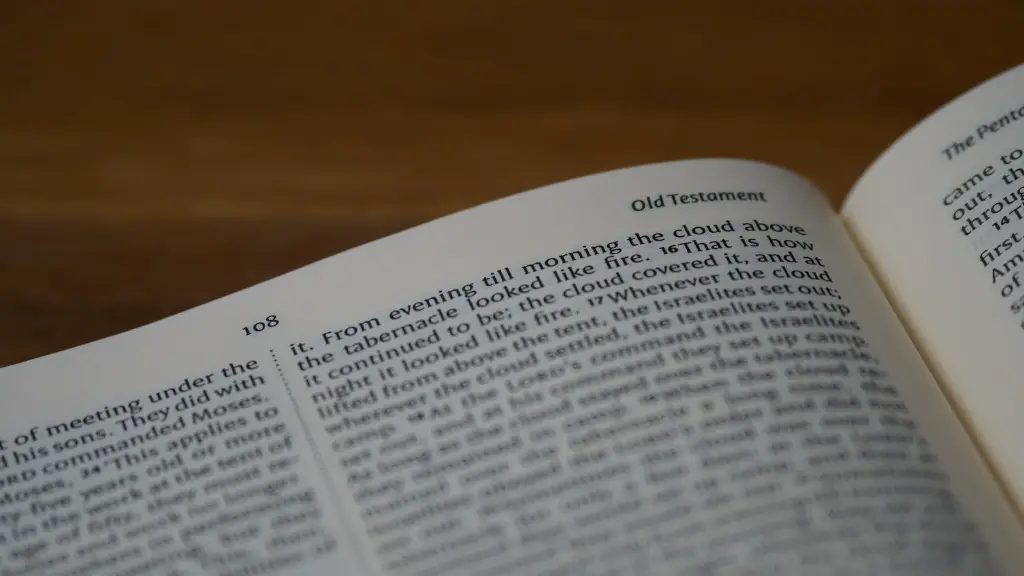LGBTQ Identity
The Bible does not directly address the concept of LGBTQ identity as it is understood today. That being said, the Bible does mention that there should be a distinction between sexes and genders, and that it is not acceptable for men to have sexual relationships with one another. This creates confusion for believers in the Bible who are, or claim to be, part of the LGBTQ community because there is uncertainty about what the Bible actually says about sexuality and gender. The traditional view of the Bible is that it is against homosexuality or any form of same-sex sexual activity, but many LGBTQ advocates would argue that this interpretation is outdated, and that there is ample evidence to suggest that the Bible is not against members of the LGBTQ community.
One example is the story of Sodom and Gomorrah in Genesis, which is often interpreted as being a condemnation of same-sex relationships. However, modern scholars argue that this interpretation is wrong and that the real sin in the Sodom and Gomorrah story was not homosexuality, but a lack of hospitality towards strangers. Similarly, the New Testament does discuss same-sex relationships in Romans 1, but some scholars have argued that Paul was not actually discussing same-sex relationships, but rather idolatry and homosexuality as a result of religious worship.
What is clear from the Bible is that it is not permissible to practice same-sex sexual activity, and that marriage should only be between one man and one woman. This has been seen as a sign of disapproval of the LGBTQ community and their activities, but there is an increasing trend towards acceptance in many churches, where the leadership and congregation are viewing members of the LGBTQ community differently.
Many churches have begun to accept members of the LGBTQ community and have created spaces for them to share their stories and live authentically without fear of prejudice or persecution. While some traditionalists may find it difficult to reconcile the stance of the Bible regarding same-sex relationships with the growing acceptance of LGBTQ communities, many believe that there is room for different interpretations of scripture and that it is important to recognize that there are a variety of views on this issue.
It is important to note that although the Bible does not explicitly condone same-sex relationships, it also does not condemn individuals that identify as LGBTQ. This can be seen in the way that Jesus engaged with those who were unlike himself. He treated everyone with respect, regardless of their sexual orientation or gender identity. Jesus also commanded that his followers practice mercy and compassion, which many scholars argue is applicable to members of the LGBTQ community.
Biblical Interpretations
When discussing what the Bible says about the LGBTQ community, it is important to remember that there are a wide variety of interpretations of scripture, and that the interpretation of individual passages can vary drastically depending on who is reading them. Conservative Christians often appeal to the traditional interpretation of the Bible when discussing same-sex relationships, while more progressive Christians may take a different interpretation of the same passages. The debate about the biblical definition of marriage is further complicated when considering the increased recognition of same-sex relationships in societies around the world.
It is also important to remember that the Bible does not specifically address the concept of gender identity or sexuality. This is an issue that has come to the forefront of public discourse in recent years, which has led to an evolution of opinions regarding what is and what isn’t acceptable behavior. This evolution in public opinion has led to disparities between different denominations and interpretations of the Bible.
For example, many denominations within the United Methodist Church have adopted a new policy that allows for the ordination of openly LGBTQ individuals and the recognition of same-sex marriage. This marks a significant shift in their interpretation of scripture. Other churches, such as the Southern Baptist Convention, remain supportive of traditional marriage and do not support the ordination or recognition of same-sex marriages.
Gay and Transgender Rights
The Bible does not have a clear stance on the rights of gay and transgender individuals. This has led to debate in the Christian community about whether it is appropriate for Christians to support or oppose the rights of gay and transgender individuals. While there is no single answer, most Christians acknowledge that everyone, regardless of gender or sexual identity, deserves respect and should be treated fairly.
The Bible does, however, provide some insight into the issue of gay and transgender rights. For example, 1 Corinthians 7:7 says, “Each person should live as a believer in whatever situation the Lord has assigned to them, just as God has called them.” This passage is often interpreted as being supportive of the notion that individuals should be free to live as they choose and to accept themselves as they are.
In addition, the Sermon on the Mount (Matthew 5-7) is often seen as a guide for how Christians should interact with one another. Jesus encourages his followers to love their neighbors as themselves and to treat others with kindness and respect. This is often interpreted as an endorsement of the notion that everyone should be respected and treated with dignity, regardless of their gender or sexual identity.
While the Bible does not directly address the issue of gay and transgender rights, it does provide some insight into how Christians should respond to the issue. While different denominations may have different opinions on the matter, it is broadly accepted that all individuals should be treated with respect and compassion.
Discrimination and Prejudice
The Bible is clear that discrimination and prejudice based on sexual orientation or gender identity is wrong. In Galatians 3:28, it is written, “There is neither Jew nor Greek, there is neither bond nor free, there is neither male nor female: for ye are all one in Christ Jesus.” This verse is often interpreted as a condemnation of discrimination and prejudice based on gender or sexual orientation.
Jesus himself also spoke out against discrimination and prejudice. In Matthew 22:39, Jesus said, “Love your neighbor as you love yourself.” This is often seen as an endorsement of the notion that everyone should be given equal respect and treatment, regardless of their gender or sexual orientation. In addition, the Bible teaches us to live in peace and harmony with one another, which means treating all people with dignity and respect.
The Bible also discusses justice and mercy. In Micah 6:8, it is written, “He has told you, O mortal, what is good; and what does the Lord require of you but to do justice, and to love kindness, and to walk humbly with your God?” This could be interpreted as God calling us to resist discrimination and prejudice, as well as to show mercy to those who may be different from us.
Conclusion
The Bible is not clear cut on the issue of the LGBTQ community, but there are passages and teachings that can be interpreted as being supportive of the rights and dignity of LGBTQ individuals. While different denominations may hold different views on the matter, most agree that everyone should be treated with respect, regardless of gender or sexual orientation. Furthermore, the Bible teaches that discrimination and prejudice are wrong, and that we should strive to be just and merciful in our interactions with one another.




